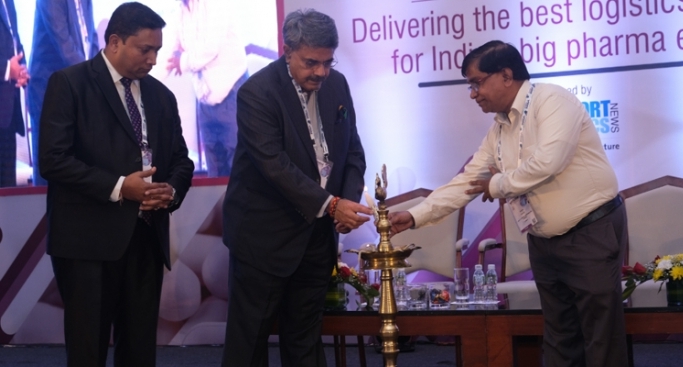Pharma logistics stakeholders take ownership of compliance, data, and training of people
September 20, 2019: The third edition of the Global Pharma Logistics Summit concluded in Mumbai on Thursday, September 19, 2019, pledging to touch the lives of people around the globe with innovation and collaboration.

September 20, 2019: The third edition of the Global Pharma Logistics Summit concluded in Mumbai on Thursday, September 19, 2019, pledging to touch the lives of people around the globe with innovation and collaboration.
The event deliberated on various challenges the sector is facing in terms of quality, regulation, and technology while assisting the manufacturers to transport and export up to delivery to the end consumer. The summit also witnessed the stakeholders coming up with solutions to tackle these challenges.
The cross-industry event organised by Indian Transport and Logistics News, a STAT Media Group publication, was supported by GVK-led Chhatrapati Shivaji Maharaj International Airport Mumbai or Mumbai International Airport Limited (MIAL), Cargo Service Centre (CSC), Delhivery, DoKaSch, Penta Freight, Allied Aviation, Kale Logistics, and ColdBox.
Dr PBN Prasad, deputy drugs controller (India), CDSCO said, “India is the pharmacy of the world as the largest producer of the generic drug. Despite the stringent regulatory compliance demanded by the government, we have signs of hope as the Indian pharmaceutical industry is moving forward. However, along with this, it is also important to deliver the right medicine at the right time with the right temperature which refers to the quality. CDSCO is acting more as a facilitator and less as a regulator for exporters.”
With the slogan #MumbaiMovesPharma, the event had in attendance various stakeholders from regulators to manufactures and from logistics providers to technology providers. Four engaging panel discussions led by industry experts, new agreements signed by companies, campaigns initiated by stakeholders and interactive sessions all enriched the one day conference.
Delhivery, India’s leading supply chain services company, signed an agreement to become a member with the international industry collaborator Pharma.Aero.
S Anantha Krishnan, commissioner of customs (export), Mumbai Customs said, "The Customs has changed a lot since 2005 and long gone are the days when customs used to check every single consignment. Now 95 percent of all cargo and 100 percent of pharmaceuticals goes unchecked to facilitating the exports. We are assuring that we are not controllers anymore instead we are the facilitators and I’m just 10 digits away."
At the event, CSC unveiled its new newsletter 'Beyond The Box' and also a new logo.
Tushar Jani, chairman, Cargo Service Centre, said, "We are touching the lives of millions of people out there whenever we are handling and delivering the pharmaceuticals to the patients somewhere far away from us. With the kind of development we are having, India will become the development centre for pharmaceuticals very soon. I'm happy to see Mumbai International Airport Limited (CSMIA) is taking the lead to strengthen pharma chain." The upcoming Pharma Excellence Centre at MIAL will be ready by mid-November, informed Jani.
Manoj Singh, SVP & head cargo, MIAL said, “Pharma is one of the most important focus of the GVK-led Mumbai airport. Despite the challenges we have faced, including that of land availability, the airport cargo has lived up to the expectations and more. We have made a facility for Allied Aviation and Envirotainer at Mumbai airport, which has been launched on September 13, 2019. The airport handled 1 lakh tonnes of pharma cargo in the financial year of 2018-19. We are again committed to providing safe and secure transportation of pharma cargo in the future too.”
One of the panels on quality, compliance, training, witnessed a heated discussion on providing training to the cargo handlers. The panel along with the audience came to a consensus that there should be an open platform, infrastructure developed and syllabus crafted as we need young blood to come and deal with the sensitive cargo with care. All stakeholders agreed to take ownership to train their people.



